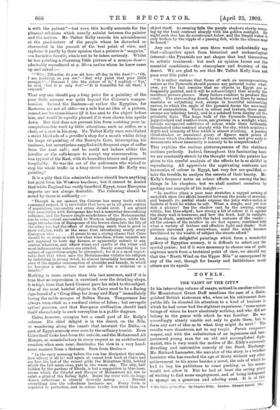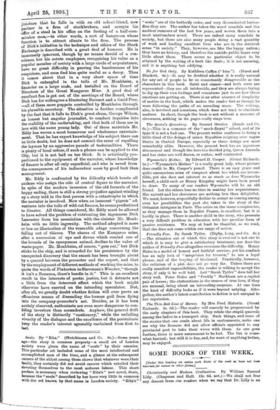NOVELS.
THE TAINT OF THE CITY"
Isr his interesting volume of essays, noticed in another column, Sir Monntstuart Grant Duff mentions the case of a distin- guished British statesman who, when on his retirement from public life he directed his attention to a kind of business in which he had never had the slightest experience, "came across beings of whom he knew absolutely nothing, and who did not belong to the genus with which he was familiar. He was accordingly utterly unable not only to guide them, but to form any sort of idea as to what they might do next." The results were disastrous, not to say tragic. Parris componere magna, and with the substitution of an ingenuous and inex- perienced young man for an old and accomplished diplo- matist, this is very much the motive of Mr. Eddy's extremely diverting and instructive comedy of the Stock Exchange. Mr. Richard Lancaster, the narrator of the story, is a brieiless barrister who has reached the age of thirty without any other achievement to his name besides a novel, the sale of which he had to beg his publishers to cease pushing, as his means would not allow it. But he had at least the saving grace of wishing to find some employment, and of being indisposed to sponge on a generous and adoring aunt. It is at this • The Taint of the City. By Charles Eddy. London : Edward Arnold. ld•! juncture that he falls in with an old school-friend, now partner in a firm of stockbrokers, and accepts his offer of a stool in his office on the footing of a half-com- mission man,—in other words, a sort of banger-on whose function is to attract clients to the firm. The process of Dick's initiation in the technique and ethics of the Stock Exchange is described with a great deal of humour. He is immensely ignorant, though by no means devoid of a con- science, but his astute employers, recognising his value as a popular member of society with a large circle of acquaintance, have no great difficulty in proving the baselessness of his suspicion% and soon find him quite useful as a decoy. Thus it comes about that in a very short space of time Dick is entangled in the toils of Mr. Monkheim, a financier on a large scale, and installed on the Board of Directors of the Great Kangaroo Mine. A good deal of excellent fun is got out of the meetings of the Board, where Dick has for colleagues a blustering Baronet and a timid Peer, —all of them mere puppets controlled by Monkheim through his plausible secretary. The situation is further complicated by the fact that it falls to Dick's great chum, George Wilson, an honest but angular journalist, to conduct inquiries into the stability of the undertaking, and that both of them are in love with the same young lady. Out of these materials Mr. Eddy has woven a most humorous and wholesome entertain- ment. That he has expert knowledge of his subject there can be little doubt, but he does not commit the error of repelling the layman by an aggressive parade of technicalities. There is plenty of local colour, if such a phrase can be applied to the City, but it is not laid on too thick. It is artistically pro- portioned to the equipment of the narrator, whose knowledge of finance is after all only superficial, and who is saved from the consequences of his indiscretion more by good luck than management.
Mr. Eddy is confronted by the difficulty which besets all authors who assign the role of central figure to the narrator. In spite of the modem inversion of the old formula of the happy ending, there is still a strong prejudice against winding up a story told in the first person with a catastrophe in which the narrator is involved. Now when an innocent "pigeon" ad- ventures into the toils of wild-cat finance, he seems predestined to disaster. All things considered, Mr. Eddy must be allowed to have solved the problem of extricating the ingenuous Dick Lancaster from his association with the sinister Mr. Monk- heim with no little ingenuity. The method adopted is more or less an illustration of the venerable adage concerning the falling out of thieves. The shares of the Kangaroo mine, after a succession, of ups and downs which remind one of the bounds of its eponymous animal, decline to the value of waste-paper. Mr. Monkheim, of course, "gets out," but Dick sticks to the ship, and is rewarded for his persistence by the unexpected discovery that the smash has been brought about by a quarrel between the promoter and the expert, and that by the employment of different methods of working the mine, to quote the words of Pinkerton in Stevenson's Wrecker," though it isn't a Bonanza, there's boodle in it." This is an excellent result in the interests of poetic justice, but it detracts not a little from the deterrent effect which the book might otherwise have exerted on the intending speculator. But, after all, we greatly doubt whether fiction will ever prove an efficacious means of dissuading the human gull from flying into the company-promoter's net. Besides, as it has been acutely observed, enthusiasts are even more dangerous to con- fiding investors than scoundrels. Anyhow, the general drift of the story is distinctly "cautionary," while the unfailing vivacity of the dialogue and the excellence of the portraiture keep the reader's interest agreeably enchained from first to last.



























































 Previous page
Previous page